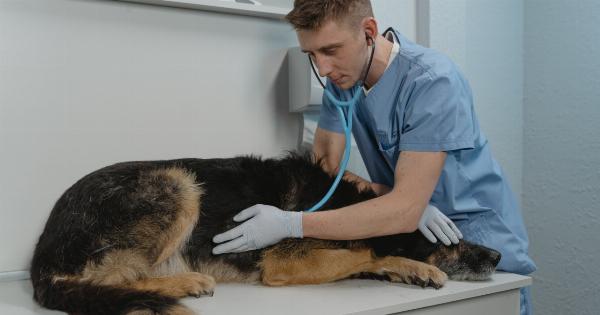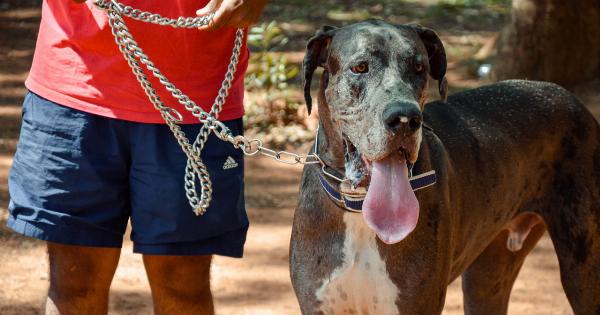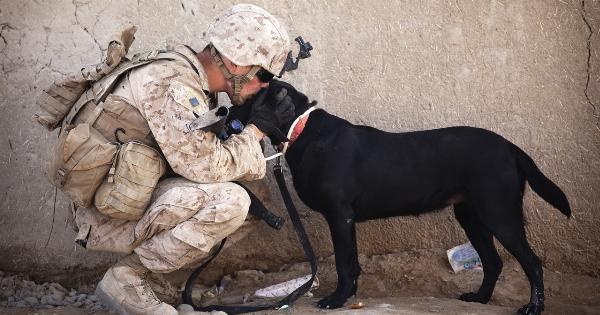Foods that are safe and delightful for humans can be toxic and even fatal to our furry friends. As responsible pet owners, it is crucial to be aware of the foods that can harm our beloved dogs.
While some foods may only cause mild digestive issues, others can lead to severe health problems or even death. In this article, we will discuss ten common foods that are harmful to dogs and should be kept out of their reach.
1. Chocolate
Chocolate contains theobromine, a substance that is toxic to dogs. Dark chocolate and cocoa powder have higher levels of theobromine and thus pose a greater risk.
Ingesting chocolate can cause vomiting, diarrhea, rapid breathing, increased heart rate, muscle rigidity, seizures, and in severe cases, it can be fatal. It is important to keep all chocolate products securely stored to prevent accidental ingestion by your four-legged friend.
2. Grapes and Raisins
Grapes and raisins, although seemingly harmless, can cause kidney failure in dogs. The exact toxic substance in these fruits is unknown, but even small quantities can lead to severe health problems.
Symptoms of grape or raisin toxicity include vomiting, diarrhea, abdominal pain, lethargy, dehydration, and possible tremors. If you suspect your dog has ingested grapes or raisins, it is crucial to seek immediate veterinary attention.
3. Onions and Garlic
Onions and garlic, in any form (raw, cooked, powdered, or dehydrated), can damage a dog’s red blood cells, leading to anemia. Symptoms may include weakness, pale gums, increased heart rate, panting, and collapse.
Prolonged exposure to these foods or ingestion of large quantities can have serious consequences. It is essential to avoid feeding dogs any food containing onions or garlic, such as certain dressings, gravies, or baby food.
4. Avocados
Avocados contain a substance called persin, which can be toxic to dogs in large amounts. While the flesh of an avocado is generally safe for dogs, the pit, skin, and leaves should always be kept away from them.
Ingestion of large avocado pits can lead to choking or intestinal obstruction. Additionally, avocados are high in fat and may cause gastrointestinal upset or even pancreatitis in dogs if eaten excessively.
5. Xylitol
Xylitol is a common sweetener found in many sugar-free products, including chewing gum, candies, baked goods, toothpaste, and peanut butter.
It can cause a rapid and severe drop in a dog’s blood sugar levels, leading to weakness, disorientation, seizures, and in severe cases, liver failure. Even a small amount of xylitol can be extremely dangerous for dogs, so it is crucial to avoid feeding them any products containing this sweetener.
6. Alcohol
Alcohol should never be given to dogs, as it can have similar effects on them as it does on humans but with far greater intensity.
Even small amounts of alcohol can cause vomiting, diarrhea, coordination problems, central nervous system depression, difficulty breathing, coma, and even death. Ingestion of beverages, foods, or medications containing alcohol can be life-threatening for dogs, so it is crucial to keep any alcoholic substances securely out of reach.
7. Coffee and Caffeine
Caffeine can be found in various products such as coffee, tea, energy drinks, colas, and certain medications.
Dogs are more sensitive to the effects of caffeine than humans, and ingestion can lead to restlessness, rapid breathing, heart palpitations, muscle tremors, and seizures. In severe cases, caffeine poisoning can be fatal. It is important to prevent dogs from accessing any caffeine-containing products and to dispose of coffee grounds safely.
8. Macadamia Nuts
Macadamia nuts and foods containing them can be highly toxic to dogs. Ingestion may result in weakness, vomiting, tremors, increased body temperature, muscle stiffness, and difficulty walking.
While macadamia nut toxicity is rarely fatal, it can cause significant discomfort and require veterinary treatment. It is crucial to ensure that dogs do not have access to macadamia nuts or any foods containing them.
9. Raw Dough and Moldy Food
Raw dough made with yeast and moldy food should never be given to dogs. Consuming raw dough can cause it to expand in a dog’s stomach, leading to bloating, discomfort, and in severe cases, a twisted stomach, which is a life-threatening condition.
Moldy food, such as bread or garbage, may contain toxins that can damage a dog’s digestive system and liver. It is necessary to prevent dogs from consuming any food that may be moldy or raw.
10. Bones
While bones may seem like a perfect treat for dogs, especially after finishing a meal, they can be extremely dangerous. Cooked bones are more likely to splinter, causing internal injuries or choking hazards.
Ingesting bones can lead to mouth, throat, or intestinal injuries, which may require emergency veterinary care. It is essential to provide dogs with safe, specially designed chew toys instead of bones.































